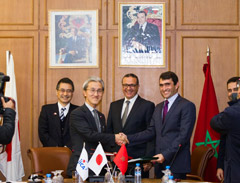Hellinic Shipping News
source: JICA
On January 16, the Japan International Cooperation Agency (JICA) signed a loan agreement with L’Institut National de Recherche Halieutique (the National Institute of Fisheries Research) in Rabat to provide a Japanese ODA loan of up to 5.371 billion yen for the Oceanographic and Fishery Research Vessel Construction Project.
Morocco has outstanding fishing grounds on the Atlantic Ocean and the fisheries industry is important to Morocco as a means for acquiring foreign currency and creating employment. The fisheries sector, which exports octopus, squid, and tuna to Japan, accounts for approximately five percent of the total amount of exports from Morocco. Since 2000, however, the marine ecosystem has become unstable due to climate change, marine pollution and other factors, resulting in unstable catch volumes and otherwise affecting the lives of people working in fisheries-related jobs.
Given these circumstances, the Government of Morocco has set resource management as a key policy with the aim of the sustainable development of fisheries industry. Toward that aim, improving the oceanographic and fisheries research capacity is a priority for the Government of Morocco.
The research vessels currently used for fisheries resource research comes from Japanese Grant provided in the past. Despite careful maintenance and management over more than two decades, a new research vessel is now desired.
In order that deep-sea products with high market value can be sustainably developed, the research capacity must be advanced, such as by building a resource assessment system based on the ecosystem, which includes the marine environment and relationships between species.
This project will construct an oceanographic and fishery research vessel capable of carrying out advanced research, thereby strengthening the scientific capability within resource management in Morocco and advancing the sustainable development of the fisheries industry. The loan will be allocated to the procurement of the research vessel, training for vessel navigation, and consulting services (including bidding assistance, overall project management and construction supervision).
The Special Terms for Economic Partnership (STEP)* will apply to the project in the agreement that was signed, and it is expected that Japanese shipbuilding technologies will be utilized.
Toward developing the fisheries industry in Morocco, JICA has utilized various types of assistance, including technical cooperation, grant aid, private partnerships and volunteer dispatches. JICA will continue to cooperate in order to achieve inclusive and sustainable growth in Morocco.
* STEP is special assistance terms for promoting the visibility of Japanese aid through a transfer of outstanding Japanese technology and expertise to developing nations. The main contract is Japan tied and subcontracting is general untied. Although the main contract allows a joint venture with the borrowing country, a Japanese company must be the leading partner in such an arrangement.
Source: JICA








